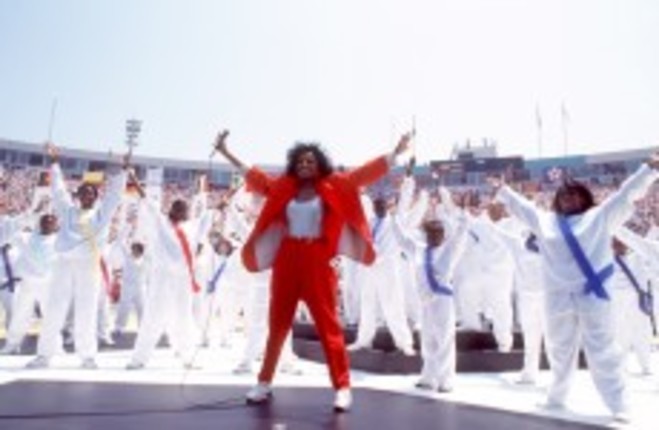1. The recent history of the World Cup is littered with heartbreaking penalty misses – Socrates in 1986, Chris Waddle in 1990 and Roberto Baggio in 1994 – but there’s another failure from the spot which deserves closer scrutiny. Where did it all go wrong for Diana Ross at Soldier Field in the opening ceremony of USA ’94?
Starting with something a little different, Adam Hurrey of Football Cliches fame deconstructs Diana Ross’ missed penalty during the USA 1994 opening ceremony.
2. The Samoan prime minister asked for a test match against the Blacks to celebrate the island’s 50th anniversary of its independence. REJECTED. Su’a William Sio, MP for Mangere, has written to Tew and the NZRU, offering to help look for sponsors to underwrite a game. Why not ask AIG. Tell them it’s American Samoa.
For those interested in international rugby, Mark Reason’s piece for Rugby Heaven on New Zealand’s continuing refusal to play a Test match in Samoa is a good read.
3. The day football died in Los Angeles: December 24, 1994. The Raiders walked off the turf of the L.A. Coliseum at 4:02 p.m. after a 19–9 loss to the Chiefs; five minutes later, 35 miles away, the Rams’ game against Washington at Anaheim Stadium ended in a 24–21 loss. The Los Angeles area hasn’t hosted an NFL game since.
Writing for The MMQB, Emily Kaplan explains how and why an NFL game hasn’t been played in L.A. for 20 years, as well as exploring the game’s history in the city.
4. But what really killed Glasgow were Leinster’s first half tries – under Joe Schmidt they specialised in ruthlessly scoring tries when the opponent was on top, and we saw glimpses of that. Zane Kirchner has been peripheral all year, but with decent service and ruthless accuracy back in-scope, he looked lethal.
In their latest blog post, Whiff of Cordite concisely sum up the game that was the Pro12 final between Leinster and Glasgow, as well as the Irish province’s season.
5. In a dimly lit concrete bunker on a deserted side street, not far from the Arruda soccer stadium in the Brazilian city of Recife, Paulo Cesar Cunha is holding his cell phone over his head and talking quickly. “When I leave the stadium, I hold my phone like this,” he says, his eyes glinting.
“I see the police watching me, and I say come on, hit me if you want. I’m filming you. And I won’t put it down until I get to my car. It’s how I defend myself.”
We’re a week late to this piece, but James Young’s exploration of the troubled world of Brazil’s ‘Organizadas’ on the pages of Rolling Stone is worth catching up with.
6. In much of Argentina, where Lionel Messi lived until he was 13, native speakers replace the “y” sound with a “sh” sound. Yo, the personal pronoun for “I,” becomes “sho,” and calle, which other Spanish speakers would pronounce “ka-yay,” becomes “ka-shey.”
The sound gives Argentine Spanish a slurry softness that resembles aspects of the Portuguese spoken in Brazil. More important to this story, that “sh,” and the fact that Messi has retained it all his life, has at times been the sole lifeline between the greatest soccer player in the world and the country he plays for.
Jeff Himmelman of The New York Times writes about the burden of being Lionel Messi. Read it.
7. For the federation, the watershed moment came in 1998 when Belgium were eliminated at the group stage at the World Cup finals in France. Bob Browaeys, who has coached Belgium youth teams at every level and played a major part in putting together Sablon’s blueprint, says there was “no unified vision on youth” at that point.
He remembers 30 federation coaches, drawn from the Dutch- and French-speaking parts of the country, meeting to discuss a radical change in approach.
The Guardian’s Stuart James explores the blueprint that has given Belgium its golden generation, who many expect to excel at the World Cup.
8. The pass is Pirlo’s trademark: he delights in assists, and rarely scores from open play. He makes his job sound simple: “I look for space so I can get the ball and then start to conduct the play.”
In an interview that is every bit as classy as the man himself, Andrea Pirlo talks to John Foot of the FT Magazine.

